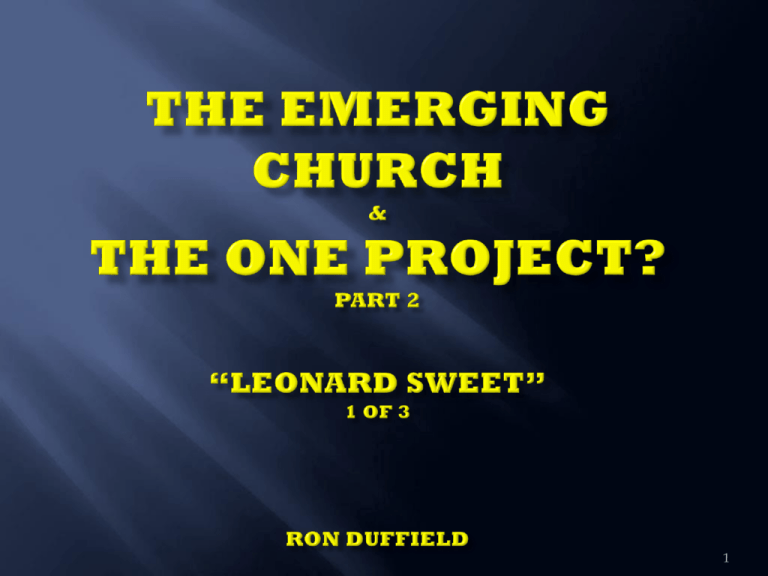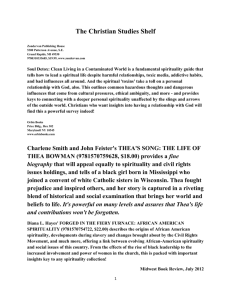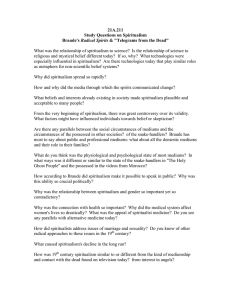The Emerging Church PART 2 LEONARD sweet Ron Duffield
advertisement

1 2 “Len Sweet was born of a mixed marriage: his mother was a fiery Pilgrim Holiness-ordained preacher from the mountains of West Virginia and his quiet father a Free Methodist lay leader from the Adirondack mountains of upstate New York. After a deconversion at 17, when Len set about less sowing wild oats than planting prairies, he became an atheist intellectual and scholar dedicated to exposing the nincompoopery and poppycockery, if not tomfoolery and skullduggery of all religions. After this seven-year period of liminality, Len came back to the faith of his ancestors, where he has been ever since, exploring the ‘insterstices’ and ‘semiotics’ of religion, culture and history.” (http://www.amazon.com/Quantum-Spirituality-Postmodern-LeonardSweet/dp/1882122011 ) 3 4 “… Len’s three-ring mission: a historian of American culture; a futurist/semiotician who ‘sees things the rest of us do not see, and dreams possibilities that are beyond most of our imagining;’ and a preacher and writer who communicates the gospel powerfully to a postmodem age by bridging the worlds of academe and popular culture.” 5 “In 2006 and 2007, Len was voted by his peers ‘One of the 50 Most Influential Christians in America’ by Church Report Magazine. Currently the E. Stanley Jones Professor of Evangelism at Drew University, Madison, NJ and a Visiting Distinguished Professor at George Fox University, Portland, Oregon, Len has been Vice President of Academic Affairs and Dean of the Theological School at Drew University for five years.” 6 “Author of more than two hundred articles, over twelve hundred published sermons, and dozens of books, Len is the primary contributor (along with his wife Karen Elizabeth Rennie) to the web-based preaching resource, sermons.com. For nine years he and his wife wrote Homiletics, which became under their watch the premier preaching resource in North America. In 2005 Len introduced the first open-source preaching resource on the Web, wikiletics.com.” (http://www.leonardsweet.com/about.php ) 7 8 “The author’s perennial plight when sitting down to write a book was first announced in Hebrews 11:8: ‘and he [Abraham] went out, not knowing whither he went.’ Even though I had no idea where I was headed when setting out on my quest of the quantum, I did have some notion of who to take with me. Certain extraordinary people….” “But some of those who led [me] into new light are: ... Matthew Fox, … Richard J. Mouw, … Rowan Williams.” “Those who have taught me how to stump around postmodern environs are psychologists James Ashbrook, …” (Quantum Spirituality, pp. viii-ix) 9 “Those who have taught me how to catch the tail winds of energies whooshing from new spiritual jet streams are entrepreneurs and business leaders … missionary theologians and journalists ….” Others that Leonard Sweet thanks include: Morton Kelsey, M. Scott Peck, Walter Brueggemann, Ken Wilber, Thomas Berry and other New Agers. (Quantum Spirituality, pp. viii-ix) 10 “No one has had a bigger role in my learning to dance to a new rhythm than conservationist/gardener Marie Aull. … Marie will not agree with everything in this book. But her presence can be felt throughout its pages, most of which were written hiding upstairs in her ‘prophet’s chamber.’ To her I dedicate this book.” “Finally I trust that the Spirit that led the author of The Cloud of Unknowing … is present in this book’s dancing, everywhere and always.” (Quantum Spirituality, p. ix) 11 “The Cloud of Unknowing is an anonymous work of Christian mysticism written in Middle English in the latter half of the 14th century. The text is a spiritual guide on contemplative prayer in the late Middle Ages. The underlying message of this work proposes that the only way to truly ‘know’ God is to abandon all preconceived notions and beliefs or ‘knowledge’ about God and be courageous enough to surrender your mind and ego to the realm of ‘unknowingness,’ at which point, you begin to glimpse the true nature of God.” “In a follow-up to The Cloud, called The Book of Privy Counseling, the author characterizes the practice of contemplative unknowing as worshiping God with one's ‘substance,’ coming to rest in a ‘naked blind feeling of being,’ and ultimately finding thereby that God is one's being.” (http://en.wikipedia.org/wiki/The_Cloud_of_Unknowing) 12 “Mysticism, once cast to the sidelines of the Christian tradition, is now situated in postmodernist culture near the center. ... In the words of one of the greatest theologians of the twentieth century, Jesuit philosopher of religion/dogmatist Karl Rahner, ‘The Christian of tomorrow will be a mystic, one who has experienced something, or he will be nothing.’” (Quantum Spirituality, p. 11). 13 “Energy-fire experiences take us into ourselves only that we might reach outside of ourselves. Metanoia is a de-centering experience of connected-ness and community. It is not an exercise in reciting what Jesus has done for me lately. Energy-fire ecstasy, more a buzz than a binge, takes us out of ourselves, literally. That is the meaning of the word ‘ecstatic.’” (Quantum Spirituality, p. 94) 14 “New Light embodiment means to be ‘in connection’ and ‘information’ with all of creation. New Light communities extend the sense of connectionalism to creation and see themselves as members of an ecological community encompassing the whole of creation. … Theologian/feminist critic Sallie McFague has argued persuasively for seeing Earth, in a very real sense, as much as a part of the body of Christ as humans. …65” “The world of nature has an identity and purpose apart from human benefit. But we constitute together a cosmic body of Christ. 66” (Quantum Spirituality, p. 124) 15 “Quantum spirituality bonds us to all creation as well as to other members of the human family. New Light pastors are what Arthur Peacocke calls ‘priests of creation’70--earth ministers who can relate the realm of nature to God, who can help nurture a brother-sister relationship with the living organism called Planet Earth. This entails a radical doctrine of embodiment of God in the very substance of creation. The Oxford Dictionary of the Christian Church (1974) identifies the difference between pantheism and panentheism: [defined in notes]… New Light spirituality does more than settle for the created order, as many forms of New Age pantheism do. But a spirituality that is not in some way entheistic (whether pan- or trans-), that does not extend to the spirit-matter of the cosmos, is not Christian.” (Quantum Spirituality, p. 125) 16 “New Light embodiment means to be ‘in connection’ and ‘information’ with other faiths. To be in-formation means to know each other’s songs almost as well as one knows them oneself, and to enlarge the community to include those whose conceptions of God differ from ours in form. To be in connection means to be able to sing, not only selected stanzas, but all the verses. …” “One can be a faithful disciple of Jesus Christ without denying the flickers of the sacred in followers of Yahweh, or Kali, or Krishna. A globalization of evangelism ‘in connection’ with others, and a globally ‘in-formed’ gospel, is capable of talking across the fence with Hindu, Buddhist, Sikh, Muslim--people from other so called ‘new’ religious traditions (‘new’ only to us)--without assumption of superiority and power.” (Quantum Spirituality, pp. 130-131) 17 “A surprisingly central feature of all the world’s religions is the language of light in communicating the divine and symbolizing the union of the human with the divine: Muhammed’s light-filled cave, Moses’ burning bush, Paul’s blinding light, Fox’s ‘inner light,’ Krishna’s Lord of Light, Bohme’s light-filled cobbler shop, Plotinus’ fire experiences, … and so on” (Quantum Spirituality, p. 235). 18 “7. Stand in front of a picture of a family member who has died. Recall joyful memories of them and laugh. With the breath you took for that laugh, your loved one literally became a part of you. In every breath there are more than a million atoms breathed personally at one time or another by every breathing earthling that has ever lived.” 19 “8. Hold your Bible and breathe meditatively. The breathtaking, nay, breath-giving truth of aliveness is more than Methuselean in its span: Part of your body right now was once actually, literally part of the body of Abraham, Sarah, Noah, Esther, David, Abigail, Moses, Ruth, Matthew, Mary, Luke, Martha, John, Priscilla, Paul... and Jesus.” 20 “9. Keep breathing quietly while holding your Bible. You have within you not just the powers of goodness resident in the great spiritual leaders like Moses, Jesus, Muhammed, Lao Tzu. You also have within you the forces of evil and destruction. … Resident in each breath you take is the body of angels like Joan of Arc and devils like Gilles de Rais, Genghis Khan, Judas Iscariot, Herod, Hitler, Stalin and all the other destructive spirits throughout history.” (Quantum Spirituality, p. 300) 21 “The new focus is on unity -- a world-wide oneness reflected in the growing union between the East and West. Leonard Sweet's book, Quantum Spirituality, sheds some revealing light of the envisioned global ‘church’ for the 21st century. In his view, the offense of the cross has been replaced with a passion for interfaith peace and possibilitythinking. To illustrate this point, Dr. Sweet points to Thomas Merton, the popular Catholic author who popularized mysticism and died in Asia searching the depths of Tibetan Buddhism.” (Berit Kjos, The Emerging Global Church) http://www.lighthousetrailsresearch.com/leonardsweet.htm 22 “The warnings of the word of God regarding the perils surrounding the Christian church belong to us today. As in the days of the apostles men tried by tradition and philosophy to destroy faith in the Scriptures, so today, by the pleasing sentiments of higher criticism, evolution, spiritualism, theosophy, and pantheism, the enemy of righteousness is seeking to lead souls into forbidden paths. To many the Bible is as a lamp without oil, because they have turned their minds into channels of speculative belief that bring misunderstanding and confusion. The work of higher criticism, in dissecting, conjecturing, reconstructing, is destroying faith in the Bible as a divine revelation. …” “The follower of Christ will meet with the ‘enticing words’ against which the apostle warned the Colossian believers. He will meet with spiritualistic interpretations of the Scriptures, but he is not to accept them. His voice is to be heard in clear affirmation of the eternal truths of the Scriptures.” (Acts of the Apostles, pp. 474-475) 23 “Pretenders will arise with theories that have no foundation in the word of God. We are to hold aloft the banner bearing the inscription, ‘The commandments of God, and the faith of Jesus.’ We are to hold the beginning of our confidence firm unto the end. Let no one attempt to dilute truth with a mixture of sophistry. Let no one attempt to tear down the foundation of our faith, or to spoil the pattern by bringing into the web threads of human devising. Not one thread of pantheism is to be drawn into the web. Sensuality, ruinous to soul and body, is always the result of drawing these threads into the web.” (Medical Ministry, p. 97-98) 24 “The prince of darkness, who has so long bent the powers of his master-mind to the work of deception, skillfully adapts his temptations to men of all classes and conditions. To persons of culture and refinement he presents Spiritualism in its more refined and intellectual aspects, and thus succeeds in drawing many into his snare. The wisdom which Spiritualism imparts is that described by the apostle James, which “descendeth not from above, but is earthly, sensual, devilish.” [James 3:15.] … He appeals to the reason by the presentation of elevating themes, he delights the fancy with enrapturing scenes, and he enlists the affections by his eloquent portrayals of love and charity. He excites the imagination to lofty flights, leading men to take so great pride in their own wisdom that in their hearts they despise the Eternal One.” (Great Controversy, 1888 ed. pp. 553-554) 25 “But Spiritualism, which numbers its converts by hundreds of thousands, yea, by millions, which has made its way into scientific circles, which has invaded churches, and has found favor in legislative bodies, and even in the courts of kings—this mammoth deception is but a revival, in a new disguise, of the witchcraft condemned and prohibited of old.” “If there were no other evidence of the real character of Spiritualism, it should be enough for the Christian that the spirits make no difference between righteousness and sin, between the noblest and purest of the apostles of Christ and the most corrupt of the servants of Satan.” (Great Controversy, 1888 ed. pp. 556-557) 26 “It is true that Spiritualism is now changing its form, and, veiling some of its more objectionable features, is assuming a Christian guise. …” “Even in its present form, so far from being more worthy of toleration than formerly, it is really a more dangerous, because a more subtle deception. While it formerly denounced Christ and the Bible, it now professes to accept both. But the Bible is interpreted in a manner that is pleasing to the unrenewed heart, while its solemn and vital truths are made of no effect. Love is dwelt upon as the chief attribute of God, but it is degraded to a weak sentimentalism making little distinction between good and evil. God's justice, his denunciations of sin, the requirements of his holy law, are all kept out of sight. … Christ is as verily denied as before; but Satan has so blinded the eyes of the people that the deception is not discerned.” (Great Controversy, 1888 ed. p. 558) 27 “Satan has long been preparing for his final effort to deceive the world. …Little by little he has prepared the way for his master-piece of deception in the development of Spiritualism. He has not yet reached the full accomplishment of his designs [1888]; but it will be reached in the last remnant of time. Says the prophet: ‘I saw three unclean spirits like frogs; . . . they are the spirits of devils, working miracles, which go forth unto the kings of the earth and of the whole world, to gather them to the battle of that great day of God Almighty.’ [Revelation 16:13, 14.] Except those who are kept by the power of God, through faith in his Word, the whole world will be swept into the ranks of this delusion.” (Great Controversy, 1888 ed. pp. 561-562) 28 “Through the two great errors, the immortality of the soul, and Sunday sacredness, Satan will bring the people under his deceptions. While the former lays the foundation of Spiritualism, the latter creates a bond of sympathy with Rome. The Protestants of the United States will be foremost in stretching their hands across the gulf to grasp the hand of Spiritualism; they will reach over the abyss to clasp hands with the Roman power; and under the influence of this threefold union, this country will follow in the steps of Rome in trampling on the rights of conscience.” “As Spiritualism more closely imitates the nominal Christianity of the day, it has greater power to deceive and ensnare. Satan himself is converted, after the modern order of things. He will appear in the character of an angel of light. Through the agency of Spiritualism, miracles will be wrought, the sick will be healed, and many undeniable wonders will be performed. And as the spirits will profess faith in the Bible, and manifest respect for the institutions of the church, their work will be accepted as a manifestation of divine power.” (Great Controversy, 1888 ed. p. 588) 29 “The line of distinction between professed Christians and the ungodly is now hardly distinguishable. Church-members love what the world loves, and are ready to join with them; and Satan determines to unite them in one body, and thus strengthen his cause by sweeping all into the ranks of Spiritualism. Papists, who boast of miracles as a certain sign of the true church, will be readily deceived by this wonderworking power; and Protestants, having cast away the shield of truth, will also be deluded. Papists, Protestants, and worldlings will alike accept the form of godliness without the power, and they will see in this union a grand movement for the conversion of the world, and the ushering in of the long-expected millennium.”(Great Controversy, 1888 ed. p. 588) 30








